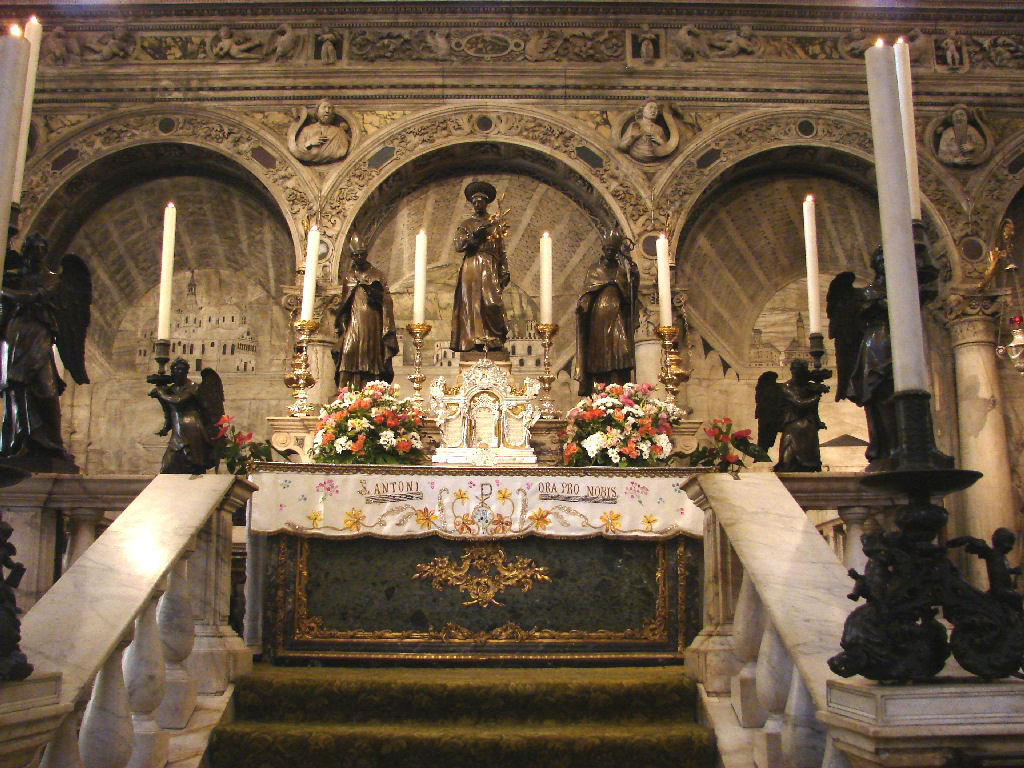|
John Soreth
John Soreth (1394 – 1471) was a Frenchman, French Carmelite friar and became a Prior General of the Order of Carmelites. John Soreth was born near Caen in Normandy, France in 1394 and entered the Carmelite house there. Ordained priest around 1417, he became a doctor of theology in Paris in 1438 and then regent of studies there. He was Provincial of the French Province from 1440-1451 and Prior General of the Order from 1451 until his death. He was unflagging in his efforts at renewal, during what was an especially critical period for both the Church and the Order. He dedicated himself entirely to the reform of the Order, travelling across Europe, making canonical visitations and promoting a more faithful observance of religious life both in the older Provinces and convents and in the Mantuan Reformed Congregation. He wrote a commentary on the Rule, his Expositio paranetica, and published new revised Constitutions in 1462. Among his other activities was the encouragement and e ... [...More Info...] [...Related Items...] OR: [Wikipedia] [Google] [Baidu] |
Beatification
Beatification (from Latin , "blessed" and , "to make") is a recognition accorded by the Catholic Church of a deceased person's entrance into Heaven and capacity to intercede on behalf of individuals who pray in their name. ''Beati'' is the plural form, referring to those who have undergone the process of beatification; they possess the title of "Blessed" () (abbreviation "Bl.") before their names and are often referred to in English as "a Blessed" or, plurally, "Blesseds". It is the third stage of the ordinary process of Canonization#Since 1983, official recognitions for Catholic saints: Servant of God, Venerable#Catholic, Venerable, Blessed, and Saint. History Local Bishops in the Catholic Church, bishops had the power of beatifying until 1634, when Pope Urban VIII, in the apostolic constitution ''Cœlestis Jerusalem'' of 6 July, reserved the power of beatifying to the Holy See. Since the reforms of 1983, as a rule, (for non-martyred Venerables) one Miracle, miracle must ... [...More Info...] [...Related Items...] OR: [Wikipedia] [Google] [Baidu] |
Pope Nicholas V
Pope Nicholas V (; ; 15 November 1397 – 24 March 1455), born Tommaso Parentucelli, was head of the Catholic Church and ruler of the Papal States from 6 March 1447 until his death in March 1455. Pope Eugene IV made him a Cardinal (Catholic Church), cardinal in 1446 after successful trips to Italy and Germany, and when Eugene died the next year, Parentucelli was elected in his place. He took his name Nicholas in memory of his obligations to Niccolò Albergati. He remains the most recent pope to take the pontifical name "Nicholas". The pontificate of Nicholas saw the fall of Constantinople to the Ottoman Turks and the end of the Hundred Years' War. He responded by calling a crusade against the Ottomans, which never materialized. By the Concordat of Vienna he secured the recognition of papal rights over bishoprics and benefices. He also brought about the submission of the last of the antipopes, Felix V, and the dissolution of the Synod of Basel. A key figure in the Roman Renaissan ... [...More Info...] [...Related Items...] OR: [Wikipedia] [Google] [Baidu] |
French Beatified People
French may refer to: * Something of, from, or related to France ** French language, which originated in France ** French people, a nation and ethnic group ** French cuisine, cooking traditions and practices Arts and media * The French (band), a British rock band * "French" (episode), a live-action episode of ''The Super Mario Bros. Super Show!'' * ''Française'' (film), a 2008 film * French Stewart (born 1964), American actor Other uses * French (surname), a surname (including a list of people with the name) * French (tunic), a type of military jacket or tunic * French's, an American brand of mustard condiment * French (catheter scale), a unit of measurement * French Defence, a chess opening * French kiss, a type of kiss See also * France (other) * Franch, a surname * French Revolution (other) * French River (other), several rivers and other places * Frenching (other) * Justice French (other) Justice French may refer to: * C. G ... [...More Info...] [...Related Items...] OR: [Wikipedia] [Google] [Baidu] |
1471 Deaths
Year 1471 ( MCDLXXI) was a common year starting on Tuesday of the Julian calendar. Events January–December * January – Portuguese navigators João de Santarém and Pedro Escobar reach the gold-trading centre of Elmina on the Gold Coast of west Africa, and explore Cape St. Catherine, two degrees south of the equator, so that they begin to be guided by the Southern Cross constellation. They also visit Sassandra on the Ivory Coast. * February - March – Champa–Đại Việt War: Emperor Lê Thánh Tông captures the Champa capital, establishing new regions in middle Vietnam. * March – The Yorkist King Edward IV returns to England to reclaim his throne. * April 14 – Battle of Barnet: Edward defeats the Lancastrian army under Warwick, who is killed. * May 4 – Battle of Tewkesbury: King Edward defeats a Lancastrian army under Queen Margaret and her son, Edward of Westminster the Prince of Wales, who is killed. * May 22 – King ... [...More Info...] [...Related Items...] OR: [Wikipedia] [Google] [Baidu] |
1394 Births
Year 1394 ( MCCCXCIV) was a common year starting on Thursday (link will display full calendar) of the Julian calendar. Events January–December * February 28 – Richard II of England grants Geoffrey Chaucer 20 pounds a year for life, for his services as a diplomat and Clerk of The King's Works. * June 11 – The Venetians take over possession of Argos, from Despot Theodore I Palaiologos. * September 17 – King Charles VI of France orders the expulsion of all Jews from France. * September 28 – Antipope Benedict XIII is elected to succeed Antipope Clement VII. * October 10 – Battle of Karanovasa: Wallachia (now southern Romania) resists an invasion by the Ottomans, and their Serb and Bulgarian vassals. * November 29 – The capital city of the Joseon dynasty (in present-day Korea) is moved from Gaegyeong (now Gaeseong) to Hanseong (now Seoul). * December 6 – The astronomical clock of St. Nicholas Church in Stralsund is finished and signed by Nikolaus Lilienfe ... [...More Info...] [...Related Items...] OR: [Wikipedia] [Google] [Baidu] |
Priors General Of The Order Of Carmelites
Prior (or prioress) is an ecclesiastical title for a superior in some religious orders. The word is derived from the Latin for "earlier" or "first". Its earlier generic usage referred to any monastic superior. In abbeys, a prior would be lower in rank than the abbey's abbot or abbess. Monastic superiors In the Rule of Saint Benedict, the term appears several times, referring to any superior, whether an abbot, provost, dean, etc. In other old monastic rules, the term is used in the same generic sense. With the Cluniac Reforms, the term ''prior'' received a specific meaning; it supplanted the provost or dean (''praepositus''), spoken of in the Rule of St. Benedict. The example of the Cluniac congregations was gradually followed by all Benedictine monasteries, as well as by the Camaldolese, Vallombrosians, Cistercians, Hirsau congregations, and other offshoots of the Benedictine Order. Monastic congregations of hermit origin generally do not use the title of abbot for the he ... [...More Info...] [...Related Items...] OR: [Wikipedia] [Google] [Baidu] |
Venerated Carmelites
Veneration (; ), or veneration of saints, is the act of honoring a saint, a person who has been identified as having a high degree of sanctity or holiness. Angels are shown similar veneration in many religions. Veneration of saints is practiced, formally or informally, by adherents of some branches of all major religions, including Christianity, Judaism,"Veneration of saints is a universal phenomenon. All monotheistic and polytheistic creeds contain something of its religious dimension... " Hinduism, Islam, Buddhism and Jainism. Within Christianity, veneration is practiced by groups such as the Catholic Church, Eastern Orthodox Church, and the Oriental Orthodox Church, all of which have varying types of canonization or glorification processes. In Catholicism and Orthodoxy, veneration is shown outwardly by respectfully kissing, bowing or making the sign of the cross before a saint's icon, relics, or statue, or by going on pilgrimage to sites associated with saints. The Lutheran C ... [...More Info...] [...Related Items...] OR: [Wikipedia] [Google] [Baidu] |
Prior General Of The Order Of Carmelites
The Prior General of the Order of Carmelites is the Superior General of the Order of the Brothers of the Blessed Virgin Mary of Mount Carmel, commonly known as the Carmelites. Prior General of the Order Notes References {{Reflist Carmelites Lists of Roman Catholics, Carmelites Priors General of the Order of Carmelites, * ... [...More Info...] [...Related Items...] OR: [Wikipedia] [Google] [Baidu] |
Baptista Mantuanus
Baptista Spagnuoli Mantuanus, O.Carm (, English: Battista the Mantuan or simply Mantuan; also known as Johannes Baptista Spagnolo; 17 April 1447 – 22 March 1516) was an Italian Carmelite reformer, humanist, and poet. Biography Spagnoli was born of a Spanish family that had settled in Mantua, the northern Italian city that gave him his most commonly used English name. He was the eldest son of Peter Spagnoli, a Spanish nobleman at the court of Mantua.Zimmerman, Benedict. "Blessed Baptista Mantuanus." The Catholic Encyclopedia Vol. 2. New York: Robert Appleton Company, 1907. 24 December 2018 He studied there under the humanists Giorgio Merula and [...More Info...] [...Related Items...] OR: [Wikipedia] [Google] [Baidu] |
Françoise D'Amboise
Françoise d'Amboise, O.Carm (9 May 1427 – 4 November 1485) was a French Carmelite nun. Biography D'Amboise was born in the castle of Thouars. She was the daughter of the rich noble Louis d'Amboise, prince of Talmont and Viscount of Thouars, and Louise-Marie de Rieux.Diane E. Booton, ''Manuscripts, Market and the Transition to Print in Late Medieval Brittany'', (Ashgate Publishing, 2010), 147. To escape from the violence of the times, she fled with her mother to the court of Brittany, which resided in Vannes and, later on, in Nantes. At the age of three she had been engaged to Peter, the second son of John V, Duke of Brittany, for political reasons. She married him at the age of fifteen, in 1442. In 1450, after the unexpected death of Pierre's elder brother, her husband came to rule Brittany as Pierre II. Françoise d'Amboise became the Duchess of Brittany and had a discrete but active share in governing Brittany. She came to help the poor and the sick. She had also a ... [...More Info...] [...Related Items...] OR: [Wikipedia] [Google] [Baidu] |
Carmelite
The Order of the Brothers of the Blessed Virgin Mary of Mount Carmel (; abbreviated OCarm), known as the Carmelites or sometimes by synecdoche known simply as Carmel, is a mendicant order in the Catholic Church for both men and women. Historical records about its origin remain uncertain; it was probably founded in the 12th century on Mount Carmel in the Holy Land. Names The Order of the Brothers of the Blessed Virgin Mary of Mount Carmel are also known simply as the Carmelites or the Carmelite Order. To differentiate themselves from the Discalced Carmelites (founded in 1562), who grew out of the older order but today have more members, the original Carmelites are sometimes known as the Carmelites of the Ancient Observance and very rarely the Calced Carmelites ( discalced being a reference to some religious orders going barefoot or wearing sandals instead of shoes). History Historical records about its origin remain uncertain, but the order was probably founded in the 12th ... [...More Info...] [...Related Items...] OR: [Wikipedia] [Google] [Baidu] |





